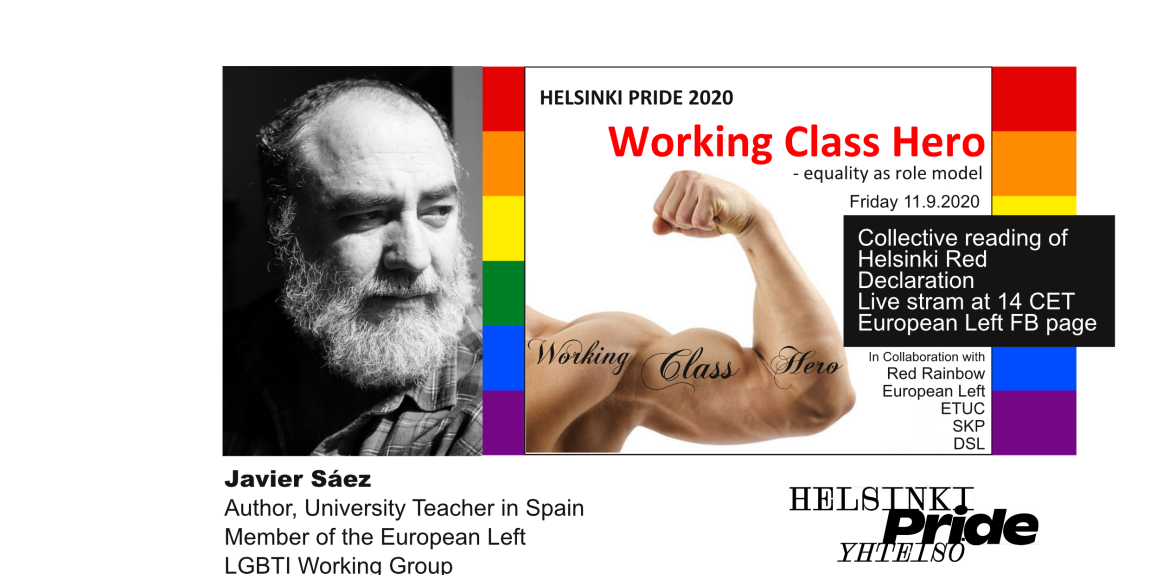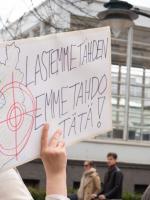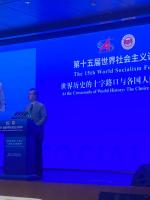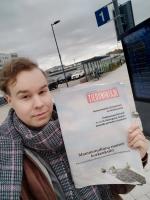Towards LGBTI friendly work environments
LGBTI activist and author of several books on queer theory, university teacher and, and translator Javier Sáez is member of European Left LGBTI working group and the Spanish Left (Izquierda Unida). Sáez has been working in the collective process of the Helsinki PRIDE Red Declaration on better LGBTI workers' rights.
Activist Javier Sáez has been involved in LGTB movements and associations since the 80s and also in political movements trying to show that relationship between the class struggle and the fight for freedom in sexual diversity and against homophobia.
Saez is the responsible spokesperson for the LGTB group of Izquierda Unida in the Madrid region (ALEAS IU-Madrid).
- My mandate is precisely to include in the party the approaches of the LGTB needs within the policies and programs of Izquierda Unida, helping to draft measures and laws with a LGBT approach, and to represent Izquierda Unida at LGBT meetings, seminars, Pride, congress, media, etc, says Sáez.
Spain and LGBTI rights
Regarding the situation of LGBTI rights in Spain, Sáez sees that the Spanish Left, Izquierda Unida has a very complete program of measures to improve LGBTI rights.
- We drafted and support the approval of a National Comprehensive Law of LGBTI rights, and a Trans rights law that includes gender self-determination and against pathologization (both laws will be passed this year). We support promoting employment projects for LGBTI people and all kinds of measures to avoid discrimination and homophobia in all areas of life and society. We also support trans rights and trans women as women (this is regarding TERF wars ... a long debate), says Sáez.
According Sáez current problem is the far-right movements that have risen in Spain and seriously threaten the conquests of the LGBTI movement.
- We are also concerned about the situation of LGBTI migrants who do not receive good care from the Spanish government and who do not receive asylum status when many of them have the right to it, given persecution of transphobia and homophobia in their countries. And of course, we are interested in working class: many workers are gay lesbian bisexual and transsexual; we must create LGBTI friendly work environments and improve labour conditions and workers' rights, explains Sáez
Directive on discrimination
Sáez thinks that the approval in all EU countries of a comprehensive law on LGBTI rights, and passing the proposal Directive on discrimination on all grounds, which is blocked since 2008 by some conservative parties and countries, could help the LGBTI people at their workplaces.
- The comprehensive national law should include training for employers and unions on LGBT diversity, LGBT friendly environments at work, fight against homophobic harassment and also compulsory education in schools on these issues. There have been specific experiences on this in Spain that have worked very well, underlines Sáez.
Red PRIDE Declaration
Sáez finds it important that we collectively write manifestos like today (11.9.) published Helsinki Red Pride Declaration within the framework of Pride because according to Sáez Pride events tend to forget class inequalities, power struggles.
- Within the LGBT community there are important class differences, there is poverty there, racism, I think this type of statement is important to link rights LGTB with labour rights and social rights; do not separate people as if LGTB people do not have social class problems but politicizing all Prides is fundamental, says Sáez.
European Left fighting for the LGBTI
In terms of the LGTB struggle of the European Left Javier Sáez, as a member of the working group hopes for a greater commitment of the EL parties. Sáez wishes to see that EL parties would put LGBTI rights at the forefront in their agendas.
- LGBTI rights is not something secondary, as has sometimes happened with feminism. I also believe that women's rights and LGTB rights are politically transformative and I believe that the left has not understood that sometimes the role of unions is important but happens as to the left, until recently, Trade Unions did not understand the importance of sexual diversity in the field of labour rights, our diversity contributes a lot to the world of work and we also need unions to be aware of all this. I think that they have improved their awareness on this issue but I think we should work together much more LGBTI associations and unions. In Spain it has been done on occasions and it has been very very positive. In the Basque Country, for example part of the LGBTI movement supported a strike and a demonstration of metalworkers, last year; this was a surprise to the workers who suddenly saw LGBTI people join them in the demonstration as LGBTI and they were very welcome and participated in the final speech, sasys Saez.
Intersectional approach
Sáez thinks that the LGBTI struggle and the struggle of the left-wing parties also have to be involved against racism and also articulate with the feminist movement.
- In Spain I work in an association for the rights of Romani people, who experience enormous discrimination and who are also workers, some are also LGBTI and we see that it is much more positive to work against racism within the LGTB movements; some LGTB people can be racist; some people of ethnic minorities can be homophobic; Pride can support pink washing and homonationalism; racism that does not represent me; LGBTI people who exploit other people does not represent me; we have to fight against this and be aware of it. With an intersectional approach: class, race, gender, poverty, disability, etc., concretizes Javier Sáez.




